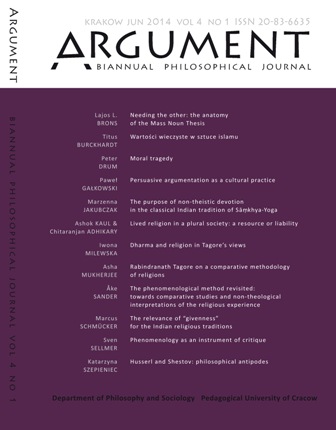Dharma and Religion in Tagore’s Views
Dharma and Religion in Tagore’s Views
Author(s): Iwona MilewskaSubject(s): Philosophy, Non-European Philosophy, Indian Philosophy
Published by: Wydawnictwo Uniwersytetu Komisji Edukacji Narodowej w Krakowie
Keywords: Rabindranath Tagore; universal religion; dharma; The Religion of Man; Indian thought; freedom; comparative methodology; religious studies; philosophy of religion
Summary/Abstract: Rabindranath Tagore (1861–1941), one of the greatest contemporary Indian thinkers, discussed the problem of comparative study of religion and faith on the grounds of global pluralism and religious diversity. He presented his views in numerous poetical works but he also delivered many speeches, mostly addressed to Western audiences. In his writing, Tagore often uses the English term “religion” and the Sanskrit term dharma interchangeably. This article focuses on both key terms and on the question whether they may be seen as equivalent according to him. To answer this question one needs to consider their etymological meanings but also Tagore’s concepts of the so called “Man the Eternal” and “Divinity in Man”.
Journal: ARGUMENT: Biannual Philosophical Journal
- Issue Year: IV/2014
- Issue No: 1
- Page Range: 81-88
- Page Count: 8
- Language: English

